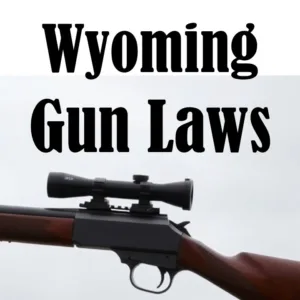Wyoming is known for its permissive gun laws, allowing both open and concealed carry without a permit for eligible residents. This guide covers Wyoming’s firearm regulations, including purchase requirements, carry laws, restricted locations, and self-defense rights.
Wyoming Gun Laws Overview

Purchasing Firearms in Wyoming
Wyoming has minimal restrictions on purchasing firearms. There is no state permit requirement to buy firearms, but buyers must meet federal eligibility requirements.
Key Requirements:
- Permit to Purchase: Not required for any type of firearm.
- Background Check: Required for all purchases from licensed dealers but not for private sales.
- Waiting Period: There is no mandatory waiting period for firearm purchases.
- Minimum Age: Federal law sets a minimum age of 21 for purchasing handguns and 18 for long guns.
Firearm Licensing in Wyoming
Wyoming does not require a general license to own or carry firearms. Residents who choose to carry concealed firearms may do so without a permit. However, a permit may be obtained for purposes of reciprocity when traveling to other states.
Private Sales and Background Checks
Background checks are not required for private sales in Wyoming, but it is illegal to knowingly sell to individuals prohibited from owning firearms.
Open Carry in Wyoming
Open carry is legal in Wyoming for individuals 18 and older. Wyoming residents can carry firearms openly in most public areas without a permit.
Key Points on Open Carry:
- Permitless Open Carry: Allowed for those 18 and older without a permit.
- Vehicle Carry: Individuals may openly carry firearms in vehicles without a permit, although concealed carry in vehicles requires either a Wyoming Concealed Firearm Permit or compliance with Wyoming’s constitutional carry law.
Concealed Carry in Wyoming
Wyoming is a constitutional carry state, allowing residents to carry concealed without a permit. However, permits are available for those who want reciprocity with other states.
Concealed Firearm Permit (CFP):
- Eligibility: Applicants must be at least 21, pass a background check, and complete a firearm safety course.
- Application Process: CFP applications are submitted through local sheriff’s offices and require fingerprints, identification, and applicable fees.
- Permit Validity: CFPs are valid for five years.
Reciprocity with Other States
Wyoming’s concealed carry permit is recognized in multiple states. Additionally, residents can carry concealed in states that recognize Wyoming’s constitutional carry. However, checking local laws in other states is recommended when traveling.
Restricted Locations for Carrying Firearms in Wyoming
While Wyoming is permissive regarding carry laws, firearms are prohibited in some places, even for individuals with a permit.
- Schools and Educational Facilities: Firearms are prohibited on school grounds, including K-12 and certain higher education campuses.
- Government Buildings: Firearms are not allowed in courthouses, law enforcement facilities, and other designated state government buildings.
- Private Property: Property owners may prohibit firearms on their premises, and individuals must comply with any posted restrictions.
- Correctional Facilities: Firearms are prohibited in jails, prisons, and other correctional facilities.
Assault Weapons and Magazine Capacity in Wyoming
Wyoming does not restrict assault weapons or magazine capacities. Residents can legally own federally compliant firearms and accessories without additional restrictions.
Self-Defense Laws in Wyoming: Stand Your Ground and Castle Doctrine
Wyoming follows Stand Your Ground and Castle Doctrine principles, providing strong protections for self-defense.
Stand Your Ground
Wyoming law does not impose a duty to retreat, allowing individuals to defend themselves with reasonable force when they feel threatened in a place they are legally allowed to be.
Castle Doctrine
The Castle Doctrine in Wyoming allows residents to defend themselves with reasonable force, including deadly force, within their homes or on their property if faced with an imminent threat of harm.
Firearms Prohibited Persons in Wyoming
Certain individuals are prohibited from possessing firearms in Wyoming under both state and federal laws.
- Felony Convictions: Convicted felons are prohibited from firearm ownership.
- Domestic Violence Convictions: Those with certain domestic violence convictions or active protection orders cannot possess firearms.
- Mental Health Restrictions: Individuals deemed mentally unfit by a court may face restrictions on firearm ownership.
- Substance Abuse: Persons with recent drug-related convictions or substance abuse issues may be prohibited from possessing firearms.
Penalties for Violating Gun Laws in Wyoming
Violating Wyoming’s gun laws can result in criminal charges, including fines, jail time, and potential restrictions on firearm rights.
- Unlawful Possession: Possession of a firearm as a prohibited person or in restricted areas may lead to criminal charges.
- Illegal Carry: Carrying a concealed weapon in a restricted location, or without a permit where required, may result in penalties.
- Brandishing or Reckless Use: Displaying a firearm in a threatening or reckless manner can lead to criminal charges.
Conclusion: Understanding Wyoming’s Gun Laws
Wyoming’s gun laws allow for permitless open and concealed carry, with few restrictions. Residents and visitors should be aware of restricted locations and remain informed about self-defense rights to ensure they follow state laws.
FAQs About Gun Laws in Wyoming
1. Do I need a permit to buy a gun in Wyoming?
No, Wyoming does not require a permit to purchase firearms.
2. Is open carry allowed in Wyoming?
Yes, open carry is allowed for individuals 18 and older without a permit.
3. Does Wyoming restrict magazine capacity?
No, Wyoming does not impose magazine capacity limits.
4. Does Wyoming recognize out-of-state concealed carry permits?
Yes, Wyoming has reciprocity with several states and recognizes out-of-state permits from states with similar requirements.
5. What self-defense laws apply in Wyoming?
Wyoming follows Stand Your Ground and Castle Doctrine principles, allowing self-defense without a duty to retreat in certain situations.
